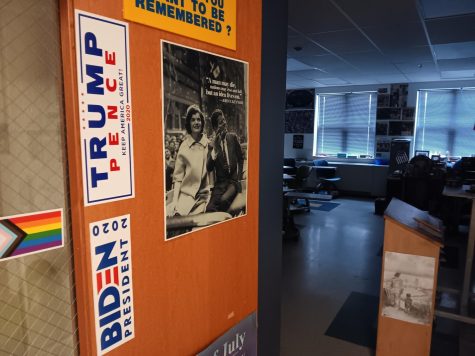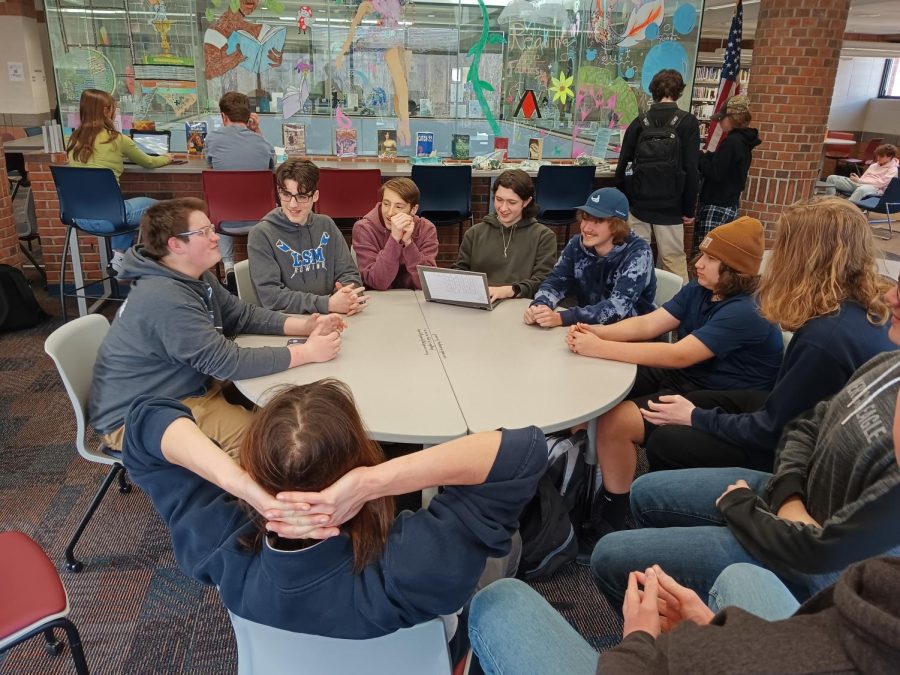What I’ve Learned Sitting in On Politics Club
Members of politics club attend a session in the library. The club meets every week, with a new topic every time.
May 2, 2023
The bell rings for Thursday homeroom. Instantly, the halls are packed with students, shuffling from classroom to classroom, whether for a half hour of doing homework or seeking teacher help. I, however, have somewhere else to be. As I’m walking towards the social studies wing, I take a side glance out the doors to the courtyard at the green, muddy grass currently being drenched by what seems to have been a week-long rainstorm. It is Jan. 5, I think to myself, and instead of snow, it is 50 degrees and raining. Continuing to head to Mr. Fowler’s room, I make a mental note to illustrate this point in a few minutes – the day’s Politics Club debate is on energy and climate change.
When I arrive, I notice two new members in attendance, as well as a healthy amount of Politics Club regulars, a group that has grown steadily since September. As with every Thursday, the chairs on the far side of Mr. Fowler’s classroom have been turned inward to create a circular council of discussion. The Smart board normally used for class lessons now displays a question in massive font: Should Humans Continue to use Fossil Fuel Gases?
The debate is productive and intuitive. Politics Club president Chris Porter starts off the debate, and a figurative baton passes from one person to the next. Points are made, and arguments are solidified. Yet the tone of the discussion is not that of division, but compromise and learning.
This has become a familiar scene to me. I’ve been attending Politics Club meetings regularly since September, and each new debate has brought a new challenge for students to tackle. The national discourse on these topics has been marred by headlines of congressional sparring and polarized ideologies – yet whether it be Russian aggression, election front-runners, or Supreme Court decisions, debate in Politics Club is always very civil and cooperative.
“Members generally create and make their own productive discussions,” says Chris Porter, senior and president of the politics club. ” We decide democratically what we want to discuss.” He says it’s a good thing that this sort of thing can happen with minimum moderation from the teacher advisor of the club, Mr. Fowler.

Chris has been leading Politics Club since the beginning of the 2022-23 school year, and oversaw a club that started out in September with three to four people and now has around fifteen members that regularly attend weekly meetings. New members have been joining at a steady pace.
“The best tool is really word of mouth,” Chris says. He describes his primary goal as making sure people have a good, fun environment in which to discuss politics and making sure that friends tell friends about the club.
This is a philosophy that has been present since a decade ago, when Politics Club first began under Mr. Fowler. According to the teacher, one rule quickly became the centerpiece of the fledgling club – “respect each other’s opinions.” Fowler describes it as a staple of the club since it began- and a core tenet of debate in the club.
“We have lost some kids over the years [because of that rule]. They saw it as an issue, they couldn’t handle the other side, and that’s a big problem in our society today,” Fowler says. “We should be able to share political views openly, honestly, without being angered at people who are different than us.”
Like the tenet of respect, the discussive standards for Politics Club are established from the very first meeting each year. Fowler describes the club as all about sharing ideas rather than combatting them.
“I wish we could have the same tone and demeanor that we have in politics club in our wider society,” he says.
Since that meeting in January, Politics Club has gained a few more members and discussed countless topics as they flit across our news screens. Chinese spy balloons, foreign support, the border crisis, and more have been settled at the desks in Fowler’s room. And no matter the topic, no matter the divisiveness of the subject, the rules ensure the discussion always remains civil.
Fowler intends to keep it running this way as the Class of 2023 prepares to pass stewardship of the club to the current juniors. He stresses that students should know that people can come here and share their views without being attacked or harassed, saying Politics Club is “a venue where they can share out views.”
“I hope it continues to be the way it has been for 10 years,” he says.
In Chris’s opinion, “I think the future of politics club is looking pretty bright. I feel that I’m leaving a very solid foundation for next year’s seniors.”
Whatever next year holds, the current political climate within isn’t likely to de-polarize in the mainstream media and within the halls of Congress. And though I’m leaving Lewis Mills, I’m excited for Politics Club to continue to provide a place for students to cooperatively discuss national issues – and hopefully continue to attract new audiences.
